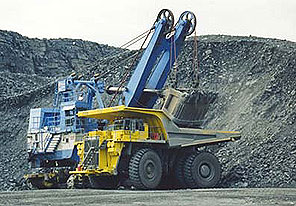Volunteer Taconite Miners Needed for Cancer Tests
July 8th, 2009. By LucyC
 At the end of June the University of Minnesota announced that it would be doing a study to find out if taconite iron ore, which is mined on Minnesota’s infamous Iron Range, is causing a higher than normal instance of asbestos mesothelioma. It seems that taconite workers on the Iron Range are dying in higher than anticipated numbers from the rare form of lung disease.
At the end of June the University of Minnesota announced that it would be doing a study to find out if taconite iron ore, which is mined on Minnesota’s infamous Iron Range, is causing a higher than normal instance of asbestos mesothelioma. It seems that taconite workers on the Iron Range are dying in higher than anticipated numbers from the rare form of lung disease.
But the researchers need your help to get the study done—specifically they need 1,200 taconite miners who worked on the Iron Range and 800 spouses, to volunteer for screening procedures.
The screening will reportedly involve two lung capacity tests, a chest x-ray, a full physical and blood test, as well as a health questionnaire. And it’s free.
The researchers also plan to review some 20,000 death certificates of men who worked in the taconite mines. That shouldn’t be hard, considering there were some 70,000 people employed in the Iron Range taconite plants between 1952 and 2009. The study results are expected sometime in 2010.
So what the heck is taconite you ask? Well, it wasn’t really anything much until a shortage of high grade iron ore hit. In fact it was considered a waste rock. After many years of laboratory tests, a team of scientists and engineers at the U of M figured out how to extract the iron ore from the rock, and turn it into taconite pellets. The development saved Minnesota’s iron ore mining industry.
But the obvious irony (bad pun, I know) is that the jobs that prolonged people livelihoods could be shortening their lives. That’s what the U of M study wants to find out. How fitting that the same university that discovered the extraction process could also determine the health risk—an association with asbestos mesothelioma. And a link is believed to be there. Dr. Jeff Mandel, a health expert at the university, told the Duluth News that they wouldn’t be doing the study if they didn’t think “there was a pretty good chance at a link.”
Reportedly, letters will be sent out in mid-July and health screenings will begin in the fall, at the Virginia Regional Medical Center. If you or someone you know may be eligible for the study and want to find out more, you can visit the website taconiteworkers.umn.edu or call 888-840-7590.
-
Leave a Reply
Archive by Category
- Accidents (24)
- Airlines (9)
- Asbestos Mesothelioma (262)
- Automotive (25)
- Celebrity (14)
- Class Action (84)
- Complaints/Comments (15)
- Consumer Fraud (84)
- Contest (2)
- Court of Public Opinion (5)
- Crazy Sh*t Lawyers See (61)
- Criminal Law (4)
- Defective Products (111)
- DePuy ASR Hip Recall (2)
- Discrimination (22)
- Drugs/Medical (248)
- Elder Care Abuse (4)
- Emerging Issues (462)
- Employment (54)
- Environment (52)
- Financial (28)
- Food Illness (15)
- Human/Civil Rights (4)
- Insecurities (5)
- Insurance (16)
- Intellectual Property (16)
- Internet/E-commerce (19)
- lawsuits (161)
- Lawyers (20)
- Lawyers Giving Back (43)
- Lex Levity (10)
- Personal Injury (106)
- Pleading Ignorance (53)
- Real Estate (2)
- Recall (6)
- Scam (3)
- Securities (13)
- Settlement (81)
- Tort Reform (2)
- Totally Tortelicious (81)
- Veterans (11)
- Whistleblower (9)